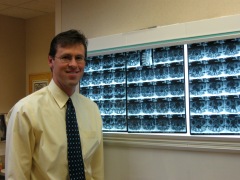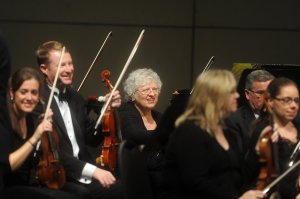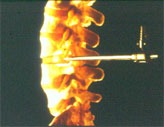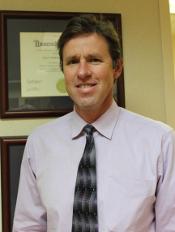Abilene July 14, 2002
At a young age, Dr. Paul McDonough was exposed to two different sides of the medical world. One of his grandfathers was a family practitioner. Another died after having spine surgery, made necessary by years of professional football injuries. Paul Roy McDonough, for whom Dr. McDonough is named, was a pro ballplayer for the Cleveland Rams and the Pittsburgh Pirates, but a series of back injuries left him in the clutches of debilitating pain. He died not long after having back surgery at the age of 42. McDonough’s father told him stories of having to help his once hale-and-hearty grandfather out of bed each morning because of his condition. “I never got a chance to meet him, but I remember hearing that story,” he said. “I would sometimes sit and think about his back surgery and wonder why it led to his untimely death.” Years later, McDonough’s step-grandfather was a primary surgeon serving in southern Utah. McDonough recalls during his summer visits hearing him creep out of the house in the night, the door softly closing behind him as he prepared to fly his small plane to wherever he was needed. “He told me a great number of surgery stories when I stayed with them,” he said. “All of these things essentially added up to my taking an interest in medicine.” Spine surgery has made incredible progress since McDonough’s grandfather died, and the grandson who bears his name is at the forefront of innovation in that field. With an impressive resume and years of training under his belt, McDonough, who came to Abilene less than a year ago, employs microsurgical techniques using a powerful microscope to make spine surgery as minimally invasive as possible. “The idea is simple: The less invasive the procedure, the easier it will be on the patient,” he said. “What we’re able to do now is make extremely small incisions and conduct very precise surgical work that lessens recovery time and is overall far more agreeable to the patient.” The physician came to Abilene after hearing of its family-friendly atmosphere, thinking it would be an excellent place to start a practice. “No one needs to or should have to travel three hours to Dallas for similar spine care,” he said. “I saw a genuine need in this area for the sorts of services I knew I could provide.” He said he has not been disappointed in the locals, finding Abilenians equal to their kindly reputation. “I have found the people of Abilene are generally very down-to-earth and appreciative of someone’s efforts to help them,” he said. “… I enjoy helping them find solutions for their problems.” Need to succeed McDonough was driven to excel at an early age. The oldest of six children, he said setting an example for his brothers and sisters was essential. “I took this responsibility seriously in many facets of my life, particularly in academic achievement,” he said. As an undergraduate at the University of Utah, he excelled in the sciences, majoring in chemistry while intrigued by his physics and anatomy courses. Those two interests eventually led him to the art and science of orthopedic surgery. Since completing his medical training, McDonough has distinguished himself by publishing multiple research papers in spine journals from 1998 to 2001, including a survey of neck surgeries in the prestigious research journal Spine. He has also performed extensive research in spinal surgery and presented his results at medical conferences in New Orleans, San Francisco, Atlanta, and Edinburgh, Scotland. McDonough participated in research for the FDA approval of bone morphogenic protein, the first genetically engineered product available for the spine, he said. “It’s a protein that stimulates the body to make more bone, which speeds healing immensely,” he said. McDonough presented the results of the research at the annual meeting of the International Society for Study of the Lumbar Spine in Edinburgh, last summer. Of all the instruction he has received, McDonough said he values his fellowship training under the direction of Dr. Thomas Zdeblick most. “He is the developer of much of the modern spinal instrumentation and is known worldwide,” McDonough said. “Training with a world-class spine surgeon really helped me develop my surgical decision-making skills.” Spine fellowship training is the highest level of training available in spine surgery in the United States, and its inclusion allows McDonough to perform complex surgeries while preparing him to find the best alternatives for each patient, he said. “The most gratifying portion of my work for me is working with people who have had severe pain for months, or even years, and then seeing them get relief with surgery and returning to the activities they enjoy,” he said. Making a difference That said, spine problems can be complex. “It takes much physical and mental energy and devotion to carefully evaluate each patient and perform the delicate and complex surgeries,” he said. “The results, both for them and for me, are worth it, though.” Sharon Anders, owner of the Mezamiz coffee house on South 7th Street, knows firsthand the benefits of such surgery. McDonough operated on her neck a few months ago, and her recovery has been “remarkable,” she said. “I was in terrible, terrible pain,” she said. “We’d tried everything first before opting for surgery, including shots in the neck, physical therapy, you name it. Nothing seemed to relieve it at all.” McDonough performed a variety of sophisticated surgical work on Anders’ neck. “Now, I have people who ask me who worked on my neck because they can see such a difference,” she said. “It really made a positive impact on my life, and he was a wonderful, caring physician throughout it all.” Although his career is important to him, and he has devoted much time to building his practice in the mere months he has been in town, McDonough also allocates time for his family and other pursuits, such as golf and playing guitar. “He’s incredibly down to earth,” said Dr. Dale Funk, a local orthopedic specialist who works with McDonough. “He’s not from Texas originally, but he may as well be. He’s an extremely laid-back, personable guy, and he’s a remarkable surgeon.” © 2011 Abilene Reporter-News. All rights reserved. By Brian Bethel at 676-6739 or bethelb@reporternews.com









